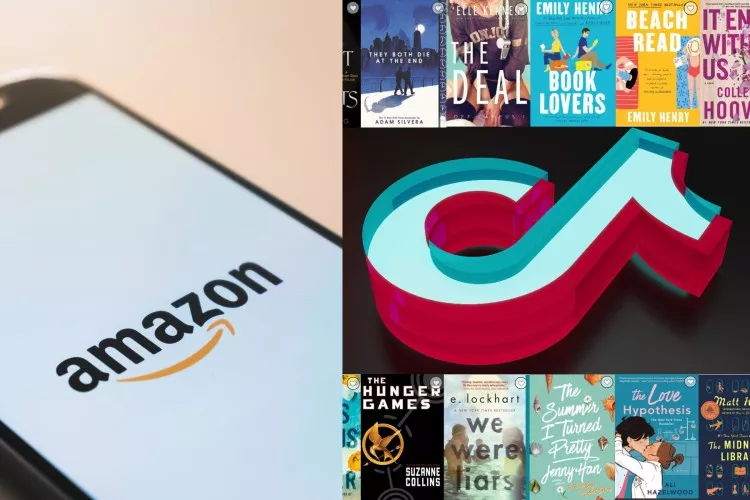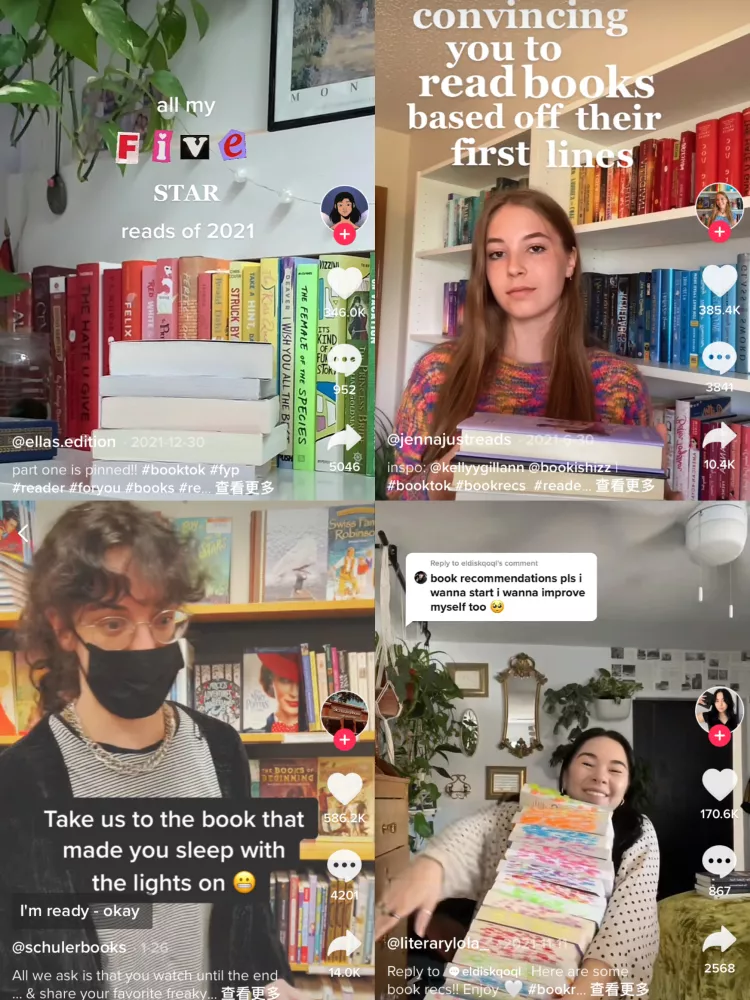
Over the past 10 years or so, e-books have continued to hit the traditional publishing industry, and the U.S. book publishing industry and tech giants like Amazon, Google, Apple, and Facebook The grudge is quite deep. Among them, Amazon, the largest e-commerce platform in the United States, is even regarded as the number one enemy by the industry because it occupies 70% of the e-book market share.
With the digital wave, the pressure on publishers to make a profit is increasing every day. However, the US book publishing industry has shown unprecedented friendliness and enthusiasm for another technology company, TikTok, compared to the sharp criticism of Amazon as "the evil force in literature".
In 2020, a book-related user community, BookTok, was born on TikTok, where readers, authors and booksellers gather to recommend their favorite books and search for classic series, building a cozy book corner on the Internet to embrace every book lover. Up to now, the related videos on BookTok have been played more than 63 billion times.
The New York Times, the Financial Times, the Guardian, Publishers Weekly and many other foreign media and leading publishing magazines have said in opinion articles that BookTok has helped authors sell 20 million books in 2021, making it a "bestselling tool" that has been recognized by readers and book publishers.
"TikTok has moved from being a new thing in the book industry to a true pillar of the market." Kristin McLean, executive director of business development at NPD Books, a US publishing statistics agency, summed up.
Amazon pushes e-readers, 'predatory' pricing resisted
Book publishing is an old industry in Europe and the United States, dating back to the invention of printing by the German merchant Johannes Gutenberg in the 15th century.
After centuries of operation, the publishing industry has developed a well-established model of "cross-subsidization": using profits from bestsellers to subsidize serious works or book categories that require significant up-front investment.
Despite the gradual rise in popularity of e-reading since the turn of the century, the sale of physical books remains the backbone of the publishing industry. According to the Association of American Publishers, physical book sales generated 76 percent of sales revenue for publishers in 2021.
However, Amazon's strong push into e-reading is breaking that rule of operation and threatening the publishing industry's job.
Federal Trade Commission Chairman Lena Khan has criticized Amazon for putting the publishing industry "in crisis", mainly because Amazon sells e-books at a loss and encourages consumers to buy its Kindle e-book readers.
By entering the market at low prices, Amazon has gradually gained control of about 70 percent of the ebook share, a dominant position that gives it the ability to force publishers to accept its terms, thereby undermining the business model they have long used to subsidize the creation of books of all kinds.

In 2021, The Verge reports on book publishers suing Amazon for copyright infringement of audiobooks they publish In the face of Amazon's siege, the U.S. book publishing industry has united in several revolts: hundreds of prominent authors have published signed letters denouncing Amazon for hurting the rights of authors and publishers; large book chains and small independent bookstores have jointly announced that they are refusing to sell Amazon published books in their stores; several top publishers have launched a class action lawsuit accusing Amazon of publishing audiobooks that infringe copyright ......

In 2014, the New York Times reported on the Writers' Alliance condemning Amazon for disrupting the marketplace In 2014, over 900 authors formed "Writers' Alliance", published a public letter in the New York Times denouncing Amazon's predatory practices on the book publishing industry. The cause was the failure of Amazon and the Acheter Group, one of the nation's largest publishers, to agree on pricing for e-books, and Acheter's fear that deep discounts on e-books would hurt paperback sales.
Aschett claims that Amazon has used a variety of "blocking" tactics against him, including removing the pre-order button for the group's upcoming books from the site, deliberately delaying the shipment of Aschett's books, and removing search results for some of his books.
After several rounds of communication and negotiation, Amazon finally reached an agreement with Acheter. Although Amazon continues to recommend books on its homepage to attract users to buy, but the theme of "Amazon infringement of the book industry" has not stopped the foreign media reports, the United States several publishing industry organizations have also complained to the regulatory authorities, requesting a review of Amazon to curb competition in the book industry.
TikTok becomes a bestselling artifact, gains industry recognition
Compared to the "cold reception" received by Amazon, the publishing industry has seen TikTok as an important channel for book promotion in the whole chain of book publishing. "TikTok has become a bestselling tool." The New York Times affirmed TikTok's role in a story in early July.
Also an online platform, unlike Amazon, which actively markets e-books, paperbacks have become a staple on TikTok. The Financial Times reported in June this year that BookTok videos present readers with a fascination for printed books: they carefully arrange shelves, share videos of books being unboxed, and play the roles of the characters in the books ...... happily share side stories about paper books.

TikTok users share book reviews Young people's passion for paper books Vividly reflected in the data. According to the latest NPD Bookscan data, U.S. readers bought 825 million paperbacks in 2021, the best-selling year for paperbacks since the agency began tracking book data in 2004. Analysts believe that book-related information posted by young people on social media platforms played a significant role in this huge number.
"Social platforms, especially TikTok, have definitely been a big factor in the spike in book sales." Kristin McLean said.
Stephen Lotinga, chief executive of the British Publishers Association, also said that since the outbreak, the publishing market has begun to see a lot of "organic interaction" compared to the usual publisher-promoted model, with young readers tapping into books they like through TikTok and sharing them with friends through social networks, which in turn drives sales of the book. The book is then shared with friends through social networks, driving sales and interest.
American e-publishing analyst and book consultant Thad Makroy has observed that BookTok started out with popular titles mostly in the young adult fantasy genre, a popular trend that has now spread to the adult fiction and non-fiction categories.
On TikTok, 2014 Pulitzer Prize-winning novelist Donna Tartt's novel The Secret History of School has become a hit with many readers, with nearly 100 million views of related videos, and the historical novel The Song of Achilles, published in 2011, also re-entered the public eye last year and spent 21 consecutive weeks on the New York Times bestseller list.

On TikTok, the video related to the novel The Secret History of School has been played nearly 100 million times "We've been keeping a close eye on the books that are making a splash on BookTok and have a BookTok section in our stores and on our online site." Shannon DeVito, head of books at Barnes & Noble, the largest bookstore chain in the US, said.
Recently, Barnes & Noble and TikTok launched a two-month summer reading challenge, #BookTokChallenge, to encourage readers to share good books on TikTok.
"Now, almost every bookstore window displays popular books from BookTok," Makroy says meaningfully, "BookTok has been in development for less than two years, yet it is sweeping the publishing world."